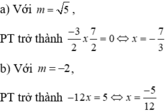Giải các phương trình sau:
a) m 2 4 + 1 − 3 x − 7 2 = 0 khi m = 5 ;
b) m 2 + 5 m − 6 x = 1 − 2 m khi m = - 2 .
Hãy nhập câu hỏi của bạn vào đây, nếu là tài khoản VIP, bạn sẽ được ưu tiên trả lời.



\(a,\left(x-6\right)\left(2x-5\right)\left(3x+9\right)=0\Leftrightarrow\left[{}\begin{matrix}x-6=0\Leftrightarrow x=6\\2x-5=0\Leftrightarrow x=\dfrac{5}{2}\\3x+9=0\Leftrightarrow x=-3\end{matrix}\right.\)
\(b,2x\left(x-3\right)+5\left(x-3\right)=0\Leftrightarrow\left(2x+5\right)\left(x-3\right)=0\Leftrightarrow\left[{}\begin{matrix}x-3=0\Leftrightarrow x=3\\2x+5=0\Leftrightarrow x=-\dfrac{5}{2}\end{matrix}\right.\)
\(c,x^2-4-\left(x-2\right)\left(3-2x\right)=0\Leftrightarrow\left(x-2\right)\left(x+2\right)-\left(x-2\right)\left(3-2x\right)=0\Leftrightarrow\left(x-2\right)\left(x+2-3+2x\right)=0\Leftrightarrow\left[{}\begin{matrix}x=2\\x=\dfrac{1}{3}\end{matrix}\right.\)
\(x=-7\left(2m-5\right)x-2m^2+8\Leftrightarrow x+7\left(2m-5\right)=8-2m^2\Leftrightarrow x\left(14m-34\right)=8-2m^2\)
\(ycđb\Leftrightarrow14m-34\ne0\Leftrightarrow m\ne\dfrac{34}{14}\)\(\Rightarrow x=\dfrac{8-2m^2}{14m-34}\)
\(3.17\Leftrightarrow4x^2-4x+1-2x-1=0\Leftrightarrow4x^2-6x=0\Leftrightarrow x\left(4x-6\right)=0\Leftrightarrow\left[{}\begin{matrix}x=0\\x=\dfrac{3}{2}\end{matrix}\right.\)
3.15:
a, \(\Leftrightarrow\left\{{}\begin{matrix}x-6=0\\2x-5=0\\3x+9=0\end{matrix}\right.\Leftrightarrow\left\{{}\begin{matrix}x=6\\x=\dfrac{5}{2}\\x=-\dfrac{9}{3}=-3\end{matrix}\right.\)
b, \(\Leftrightarrow\left(x-3\right)\left(2x+5\right)=0\)
\(\Leftrightarrow\left\{{}\begin{matrix}x-3=0\\2x+5=0\end{matrix}\right.\Leftrightarrow\left\{{}\begin{matrix}x=3\\x=-\dfrac{5}{2}\end{matrix}\right.\)
c, \(\Leftrightarrow\left(x-2\right)\left(x+2\right)-\left(x-2\right)\left(3-2x\right)=0\)
\(\Leftrightarrow\left(x-2\right)\left(x+2-3+2x\right)=0\)
\(\Leftrightarrow\left\{{}\begin{matrix}x-2=0\\3x-1=0\end{matrix}\right.\Leftrightarrow\left\{{}\begin{matrix}x=2\\x=\dfrac{1}{3}\end{matrix}\right.\)
3.16
\(\Leftrightarrow\left(2m-5\right).-7-2m^2+8=0\)
\(\Leftrightarrow-14m+35-2m^2+8=0\)
\(\Leftrightarrow-14m-2m^2+43=0\)
\(\Leftrightarrow-2\left(7m+m^2\right)=-43\)
\(\Leftrightarrow m\left(7-m\right)=\dfrac{43}{2}\)
\(\Leftrightarrow\dfrac{m\left(7-m\right)}{1}-\dfrac{43}{2}=0\)
\(\Leftrightarrow\dfrac{14m-2m^2}{2}-\dfrac{43}{2}=0\)
pt vô nghiệm

\(a,\dfrac{x-3}{x}=\dfrac{x-3}{x+3}\)\(\left(đk:x\ne0,-3\right)\)
\(\Leftrightarrow\dfrac{x-3}{x}-\dfrac{x-3}{x+3}=0\)
\(\Leftrightarrow\dfrac{\left(x-3\right)\left(x+3\right)-x\left(x-3\right)}{x\left(x+3\right)}=0\)
\(\Leftrightarrow x^2-9-x^2+3x=0\)
\(\Leftrightarrow3x-9=0\)
\(\Leftrightarrow3x=9\)
\(\Leftrightarrow x=3\left(n\right)\)
Vậy \(S=\left\{3\right\}\)
\(b,\dfrac{4x-3}{4}>\dfrac{3x-5}{3}-\dfrac{2x-7}{12}\)
\(\Leftrightarrow\dfrac{4x-3}{4}-\dfrac{3x-5}{3}+\dfrac{2x-7}{12}>0\)
\(\Leftrightarrow\dfrac{3\left(4x-3\right)-4\left(3x-5\right)+2x-7}{12}>0\)
\(\Leftrightarrow12x-9-12x+20+2x-7>0\)
\(\Leftrightarrow2x+4>0\)
\(\Leftrightarrow2x>-4\)
\(\Leftrightarrow x>-2\)

Bài `1:`
`h)(3/4x-1)(5/3x+2)=0`
`=>[(3/4x-1=0),(5/3x+2=0):}=>[(x=4/3),(x=-6/5):}`
______________
Bài `2:`
`b)3x-15=2x(x-5)`
`<=>3(x-5)-2x(x-5)=0`
`<=>(x-5)(3-2x)=0<=>[(x=5),(x=3/2):}`
`d)x(x+6)-7x-42=0`
`<=>x(x+6)-7(x+6)=0`
`<=>(x+6)(x-7)=0<=>[(x=-6),(x=7):}`
`f)x^3-2x^2-(x-2)=0`
`<=>x^2(x-2)-(x-2)=0`
`<=>(x-2)(x^2-1)=0<=>[(x=2),(x^2=1<=>x=+-2):}`
`h)(3x-1)(6x+1)=(x+7)(3x-1)`
`<=>18x^2+3x-6x-1=3x^2-x+21x-7`
`<=>15x^2-23x+6=0<=>15x^2-5x-18x+6=0`
`<=>(3x-1)(5x-1)=0<=>[(x=1/3),(x=1/5):}`
`j)(2x-5)^2-(x+2)^2=0`
`<=>(2x-5-x-2)(2x-5+x+2)=0`
`<=>(x-7)(3x-3)=0<=>[(x=7),(x=1):}`
`w)x^2-x-12=0`
`<=>x^2-4x+3x-12=0`
`<=>(x-4)(x+3)=0<=>[(x=4),(x=-3):}`
`m)(1-x)(5x+3)=(3x-7)(x-1)`
`<=>(1-x)(5x+3)+(1-x)(3x-7)=0`
`<=>(1-x)(5x+3+3x-7)=0`
`<=>(1-x)(8x-4)=0<=>[(x=1),(x=1/2):}`
`p)(2x-1)^2-4=0`
`<=>(2x-1-2)(2x-1+2)=0`
`<=>(2x-3)(2x+1)=0<=>[(x=3/2),(x=-1/2):}`
`r)(2x-1)^2=49`
`<=>(2x-1-7)(2x-1+7)=0`
`<=>(2x-8)(2x+6)=0<=>[(x=4),(x=-3):}`
`t)(5x-3)^2-(4x-7)^2=0`
`<=>(5x-3-4x+7)(5x-3+4x-7)=0`
`<=>(x+4)(9x-10)=0<=>[(x=-4),(x=10/9):}`
`u)x^2-10x+16=0`
`<=>x^2-8x-2x+16=0`
`<=>(x-2)(x-8)=0<=>[(x=2),(x=8):}`

1/a/\(\Leftrightarrow\left(x+5\right)\left(x+6\right)=0\)
\(\Leftrightarrow\orbr{\begin{cases}x+5=0\\x+6=0\end{cases}\Leftrightarrow\orbr{\begin{cases}x=-5\\x=-6\end{cases}}}\)
Vậy ...................
b/ ĐKXĐ:\(x\ne2;x\ne5\)
.....\(\Rightarrow3x^2-15x-x^2+2x+3x=0\)
\(\Leftrightarrow2x^2-10x=0\)
\(\Leftrightarrow2x\left(x-5\right)=0\)
\(\Leftrightarrow\hept{\begin{cases}2x=0\\x-5=0\end{cases}\Leftrightarrow\orbr{\begin{cases}x=0\left(nhận\right)\\x=5\left(loại\right)\end{cases}}}\)
Vậy ..............
`Answer:`
`1.`
a. \(\left(x+5\right)\left(2x+1\right)-x^2+25=0\)
\(\Leftrightarrow\left(x+5\right)\left(2x+1\right)-\left(x^2-25\right)=0\)
\(\Leftrightarrow\left(x+5\right)\left(2x+1\right)-\left(x+5\right)\left(x-5\right)=0\)
\(\Leftrightarrow\left(x+5\right)\left(2x+1-x+5\right)=0\)
\(\Leftrightarrow\left(x+5\right)\left(x+6\right)=0\)
\(\Leftrightarrow\orbr{\begin{cases}x+5=0\\x+6=0\end{cases}\Leftrightarrow\orbr{\begin{cases}x=-6\\x=-5\end{cases}}}\)
b. \(\frac{3x}{x-2}-\frac{x}{x-5}+\frac{3x}{\left(x-2\right)\left(x-5\right)}=0\left(ĐKXĐ:x\ne2;x\ne5\right)\)
\(\Leftrightarrow\frac{3x\left(x-5\right)}{\left(x-2\right)\left(x-5\right)}-\frac{x\left(x-2\right)}{\left(x-2\right)\left(x-5\right)}+\frac{3x}{\left(x-2\right)\left(x-5\right)}=0\)
\(\Leftrightarrow\frac{3x\left(x-5\right)-x\left(x-2\right)+3x}{\left(x-2\right)\left(x-5\right)}=0\)
\(\Leftrightarrow3x\left(x-5\right)-x\left(x-2\right)+3x=0\)
\(\Leftrightarrow3x^2-15x-x^2+2x+3x=0\)
\(\Leftrightarrow2x\left(x-5\right)=0\)
\(\Leftrightarrow\orbr{\begin{cases}2x=0\\x-5=0\end{cases}\Leftrightarrow\orbr{\begin{cases}x=0\\x=5\text{(Không thoả mãn)}\end{cases}}}\)
`2.`
\(ĐKXĐ:x\ne-m-2;x\ne m-2\)
Ta có: \(\frac{x+1}{x+2+m}=\frac{x+1}{x+2-m}\left(1\right)\)
a. Khi `m=-3` phương trình `(1)` sẽ trở thành: \(\frac{x+1}{x-1}=\frac{x+1}{x+5}\left(x\ne1;x\ne-5\right)\)
\(\Leftrightarrow\orbr{\begin{cases}x+1=0\\\frac{1}{x-1}=\frac{1}{x+5}\end{cases}\Leftrightarrow\orbr{\begin{cases}x+1=0\\x-1=x+5\end{cases}}\Leftrightarrow\orbr{\begin{cases}x=-1\\-1=5\text{(Vô nghiệm)}\end{cases}}}\)
b. Để phương trình `(1)` nhận `x=3` làm nghiệm thì
\(\Leftrightarrow\hept{\begin{cases}\frac{3+1}{3+2-m}=\frac{3+1}{3+2-m}\\3\ne-m-2\\3\ne m-2\end{cases}}\Leftrightarrow\hept{\begin{cases}\frac{4}{5+m}=\frac{4}{5-m}\\m\ne\pm5\end{cases}}\Leftrightarrow\hept{\begin{cases}5+m=5-m\\m\ne\pm5\end{cases}}\Leftrightarrow m=0\)

a: Khi m=2 thì pt sẽ là x^2-6x-3=0
=>\(x=3\pm2\sqrt{3}\)

Mình khuyên bạn thế này :
Bạn nên tách những câu hỏi ra
Như vậy các bạn sẽ dễ giúp
Và cũng có nhiều bạn giúp hơn !
Bài 1.
a) ( x - 3 )( x + 7 ) = 0
<=> x - 3 = 0 hoặc x + 7 = 0
<=> x = 3 hoặc x = -7
Vậy S = { 3 ; -7 }
b) ( x - 2 )2 + ( x - 2 )( x - 3 ) = 0
<=> ( x - 2 )( x - 2 + x - 3 ) = 0
<=> ( x - 2 )( 2x - 5 ) = 0
<=> x - 2 = 0 hoặc 2x - 5 = 0
<=> x = 2 hoặc x = 5/2
Vậy S = { 2 ; 5/2 }
c) x2 - 5x + 6 = 0
<=> x2 - 2x - 3x + 6 = 0
<=> x( x - 2 ) - 3( x - 2 ) = 0
<=> ( x - 2 )( x - 3 ) = 0
<=> x - 2 = 0 hoặc x - 3 = 0
<=> x = 2 hoặc x = 3

1) \(\sqrt[]{3x+7}-5< 0\)
\(\Leftrightarrow\sqrt[]{3x+7}< 5\)
\(\Leftrightarrow3x+7\ge0\cap3x+7< 25\)
\(\Leftrightarrow x\ge-\dfrac{7}{3}\cap x< 6\)
\(\Leftrightarrow-\dfrac{7}{3}\le x< 6\)

a: Thay m=-5 vào (1), ta được:
\(x^2+2\left(-5+1\right)x-5-4=0\)
\(\Leftrightarrow x^2-8x-9=0\)
=>(x-9)(x+1)=0
=>x=9 hoặc x=-1
b: \(\text{Δ}=\left(2m+2\right)^2-4\left(m-4\right)=4m^2+8m+4-4m+16=4m^2+4m+20>0\)
Do đó: Phương trình luôn có hai nghiệm phân biệt
\(\dfrac{x_1}{x_2}+\dfrac{x_2}{x_1}=-3\)
\(\Leftrightarrow x_1^2+x_2^2=-3x_1x_2\)
\(\Leftrightarrow\left(x_1+x_2\right)^2+x_1x_2=0\)
\(\Leftrightarrow\left(2m+2\right)^2+m-4=0\)
\(\Leftrightarrow4m^2+9m=0\)
=>m(4m+9)=0
=>m=0 hoặc m=-9/4

Bài 1:
a) (5x-4)(4x+6)=0
\(\Leftrightarrow\orbr{\begin{cases}5x-4=0\\4x+6=0\end{cases}\Leftrightarrow\orbr{\begin{cases}5x=4\\4x=-6\end{cases}\Leftrightarrow}\orbr{\begin{cases}x=\frac{4}{5}\\y=\frac{-3}{2}\end{cases}}}\)
b) (x-5)(3-2x)(3x+4)=0
<=> x-5=0 hoặc 3-2x=0 hoặc 3x+4=0
<=> x=5 hoặc x=\(\frac{3}{2}\)hoặc x=\(\frac{-4}{3}\)
c) (2x+1)(x2+2)=0
=> 2x+1=0 (vì x2+2>0)
=> x=\(\frac{-1}{2}\)
bài 1:
a) (5x - 4)(4x + 6) = 0
<=> 5x - 4 = 0 hoặc 4x + 6 = 0
<=> 5x = 0 + 4 hoặc 4x = 0 - 6
<=> 5x = 4 hoặc 4x = -6
<=> x = 4/5 hoặc x = -6/4 = -3/2
b) (x - 5)(3 - 2x)(3x + 4) = 0
<=> x - 5 = 0 hoặc 3 - 2x = 0 hoặc 3x + 4 = 0
<=> x = 0 + 5 hoặc -2x = 0 - 3 hoặc 3x = 0 - 4
<=> x = 5 hoặc -2x = -3 hoặc 3x = -4
<=> x = 5 hoặc x = 3/2 hoặc x = 4/3
c) (2x + 1)(x^2 + 2) = 0
vì x^2 + 2 > 0 nên:
<=> 2x + 1 = 0
<=> 2x = 0 - 1
<=> 2x = -1
<=> x = -1/2
bài 2:
a) (2x + 7)^2 = 9(x + 2)^2
<=> 4x^2 + 28x + 49 = 9x^2 + 36x + 36
<=> 4x^2 + 28x + 49 - 9x^2 - 36x - 36 = 0
<=> -5x^2 - 8x + 13 = 0
<=> (-5x - 13)(x - 1) = 0
<=> 5x + 13 = 0 hoặc x - 1 = 0
<=> 5x = 0 - 13 hoặc x = 0 + 1
<=> 5x = -13 hoặc x = 1
<=> x = -13/5 hoặc x = 1
b) (x^2 - 1)(x + 2)(x - 3) = (x - 1)(x^2 - 4)(x + 5)
<=> x^4 - x^3 - 7x^2 + x + 6 = x^4 + 4x^3 - 9x^2 - 16x + 20
<=> x^4 - x^3 - 7x^2 + x + 6 - x^4 - 4x^3 + 9x^2 + 16x - 20 = 0
<=> -5x^3 - 2x^2 + 17x - 14 = 0
<=> (-x + 1)(x + 2)(5x - 7) = 0
<=> x - 1 = 0 hoặc x + 2 = 0 hoặc 5x - 7 = 0
<=> x = 0 + 1 hoặc x = 0 - 2 hoặc 5x = 0 + 7
<=> x = 1 hoặc x = -2 hoặc 5x = 7
<=> x = 1 hoặc x = -2 hoặc x = 7/5